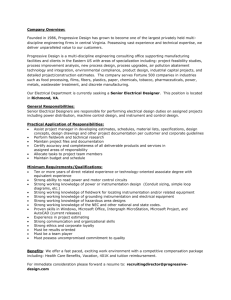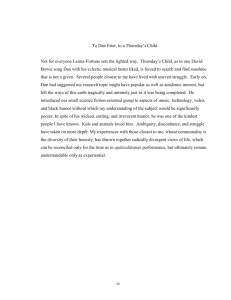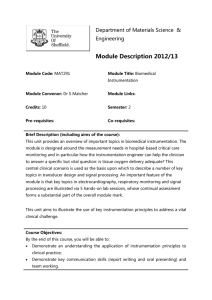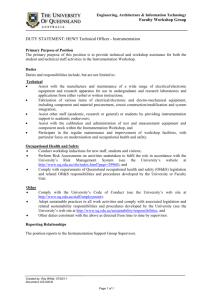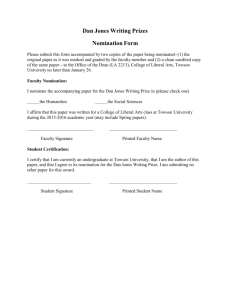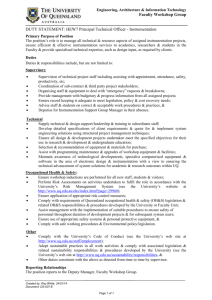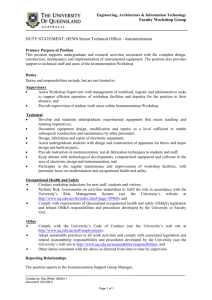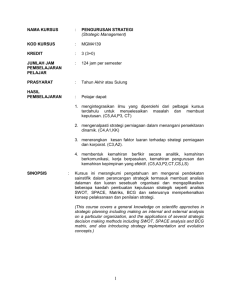Sample
advertisement
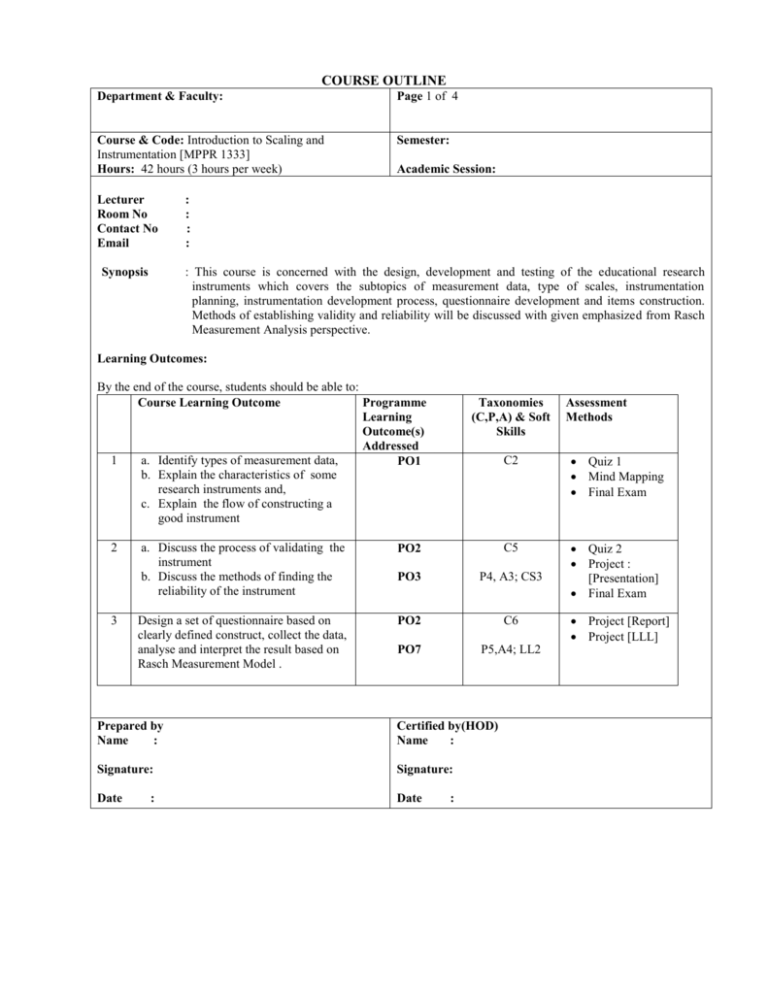
COURSE OUTLINE Department & Faculty: Page 1 of 4 Course & Code: Introduction to Scaling and Instrumentation [MPPR 1333] Hours: 42 hours (3 hours per week) Semester: Lecturer Room No Contact No Email Synopsis Academic Session: : : : : : This course is concerned with the design, development and testing of the educational research instruments which covers the subtopics of measurement data, type of scales, instrumentation planning, instrumentation development process, questionnaire development and items construction. Methods of establishing validity and reliability will be discussed with given emphasized from Rasch Measurement Analysis perspective. Learning Outcomes: By the end of the course, students should be able to: Course Learning Outcome Programme Learning Outcome(s) Addressed 1 a. Identify types of measurement data, PO1 b. Explain the characteristics of some research instruments and, c. Explain the flow of constructing a good instrument 2 3 Taxonomies (C,P,A) & Soft Skills C2 Quiz 1 Mind Mapping Final Exam Quiz 2 Project : [Presentation] Final Exam a. Discuss the process of validating the instrument b. Discuss the methods of finding the reliability of the instrument PO2 C5 PO3 P4, A3; CS3 Design a set of questionnaire based on clearly defined construct, collect the data, analyse and interpret the result based on Rasch Measurement Model . PO2 C6 PO7 P5,A4; LL2 Prepared by Name : Certified by(HOD) Name : Signature: Signature: Date Date : : Assessment Methods Project [Report] Project [LLL] COURSE OUTLINE Department & Faculty: Page 2 of 4 Course & Code: Introduction to Scaling and Instrumentation (MPF 2253) Total Lecture Hours: 42 hours (3 hours per week) Semester: Academic Session: Student Learning Time Teaching and Learning Activities Face to Face Learning Lecturer Centered Learning (LCL) a. Lecture Student Centered Learning (SCL) a. Laboratory/Tutorial b. self -learning c. information search d. reading e. group discussion 42 Non-face-to-face learning or student-centered learning (SCL) such as homework, group project, project 24 a. b. c. d. Self-Directed Learning Student Learning Time (Hours) 6 information search group discussion presentation report writing Revision a. information search b. group discussion c. report writing 21 Assessment Preparations a. Reading b. Discussion 12 12 Formal Assessment Formative Assessment (Continuous Assessment a. Quiz b. Mind mapping c. Project presentation Final 3 TOTAL 120 Teaching Methods: Lectures will be based on power point presentations, reading assignment and instruments’ critique/ review. Emphasize on Problem Based learning approach which involve group discussion and group assignment. Prepared by Name : Certified by Name : Signature: Signature: Date Date : : COURSE OUTLINE Department & Faculty: Page 3 of 4 Course & Code: Introduction to Scaling and Instrumentation (MPF 2253) Total Lecture Hours: 42 hours (3 hours per week) Semester: Academic Session: Weekly Schedule: Week 1 : Introduction To Scaling and Instrumentation Week 2 : Measurement Data (Nominal, Ordinal, Interval, Ratio) Week 3 : Types of Scales Week 4 : Instrumentation Plan Week 5 : Instrument Development Process Week 6 : Instrument Conceptualization [eg : Questionnaire] Week 7 : Item Construction Week 8 : Semester Break Week 9 : Pilot Test / Alpha Test /Beta Test Week 10 : Establish Validity Week 11 : Establish Reliability-NALI: Problem Based Learning (PBL) Week 12 : Rasch Measurement Application (Data Input ) Week 13 : Rasch Measurement Application (Data Analysis) Week 14 : Rasch Measurement Application (Data Interpretation) Week 15 : Revision Week 16-18 : Exam Prepared by Name : Certified by Name : Signature: Signature: Date Date : : COURSE OUTLINE Department & Faculty: Page 4 of 4 Course & Code: Introduction to Scaling and Instrumentation (MPF 2253) Total Lecture Hours: 42 hours (3 hours per week) Semester: Course Notes References Academic Session: : Lecture notes in power points slides is uploaded in e-learning : Aiken, L.R. (2006). Psychological Testing And Assessment. (12th ed.) Boston, MAU : Allyn and Bacon. Hogan, T.P. (2007). Psychological Testing : A Practical Introduction (2nd ed.) New Jersey, NJ : John Wiley & Sons. Lester PE; Bishop LK. (2000). Handbook Of Tests And Measurement In Education And The Social Sciences. 2nd ed. Lancaster, PA: Technomic Publishing Co. Lopez SJ; Snyder CR. (2003). Positive Psychological Assessment: A Handbook Of Models And Measures. Washington, DC: American Psychological Association. ASSESSMENT: Assessment Types Quiz 1(PO1) Quiz 2(PO2) Quantity Criteria % Total Date 2 Quiz will be administered as scheduled. No make-up quiz. 20 2X 10% =20% Week 5 & Week 11 Mind Mapping (PO1) 1 Instrumentation elements and procedures 10 1X10% =10% Due by Week 12 30 Phase 1 : Presentation 5% Phase 2 : Report 20% Life Long Learning 5% Total : 30% Phase 1 Week 11 (Assessment Feedback) Phase 2 Week 14 (Report) 40 40% Week 16-18 (Individual Assignment) Project (Group Assignment) Presentation (PO3) Report(PO2) Life Long Learning (PO7) Final Exam (P02) 1 Instrumentation Development Process Phase 1 : Draft (Presentation 5%) Phase 2 : Final (Report 20%+ Info Management –LLL 5%) 1 Total 100 Notes: PO1 Mengaplikasi pengetahuan dan kemahiran dalam bidang pengukuran dan penilaian dalam proses pengajaran dan pembelajaran secara berkesan. PO2 Menganalisis, mensintesis dan menyelesaikan masalah berkaitan bidang pengukuran dan penilaian secara saintifik, kritis dan kreatif. PO3 Menganalisis dan menilai isu semasa dalam bidang pengukuran dan penilaian dengan mengaitkannya dengan isu semasa masyarakat setempat dan antarabangsa melalui komunikasi berkesan. PO7 Mencari, mengurus dan menilai maklumat berkaitan bidang pengukuran dan penilaian secara berterusan sepanjang hayat. Pepared by Name : Certified by Name : Signature: Signature: Date Date : :
